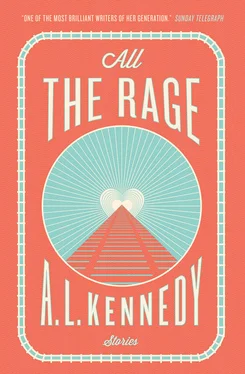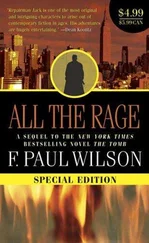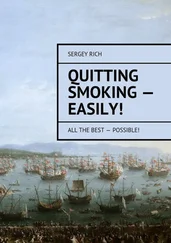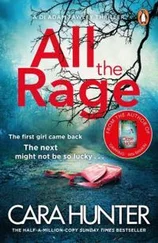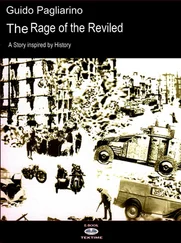She wasn’t sure she’d have the energy for all of that by then. Maybe not at the moment, either.
And low-income sexagenarians were probably sitting as usual, sitting as hard as ever, sitting and slumping and folding gradually towards the waiting horizontal, no sponsored sky-dives for them, no still-warm car keys chucked on the drawing-room table in hopes of a racy afternoon with widowers and widows.
Dorothy was taking a non-racy and non-exotic holiday. She’d needed a break and had made a point of letting sleep keep her late this initial morning, which meant that she’d missed whatever the hotel described as breakfast. This didn’t upset her. She’d woken in enjoyably slow stages at the soft close of a somehow wearying night, showered and then eaten the banana left over from yesterday’s travel before she stepped out for a potter in the town. A banana would do her fine until lunchtime. Tennis players and athletes in general ate them for potassium with positive effects at a cellular level.
She recalled a school chemistry lesson in which her teacher — Mr Collins, who sported an unfortunate type of ailing Chinese emperor’s beard — had dropped a sliver of potassium into water. The whole class had then watched as the metal wasped back and forth on the liquid’s surface in a tiny blur of lilac flames, too angry to sink. It made Dorothy smile, then and today: the idea that every human body hid a pastel shade of outrage no one should view without safety glasses, or else protective screens. It was a necessary element. Inside. The fuel for frenzy, beauty, frenzy, for evaporating types of heat was medically essential.
She breathed in sweetish, Middle Europeanish air — a sense of distant mountains about it and of overpriced market-place snacks closer at hand. The lane around her was either medieval, or a convincing reconstruction of bombed-flat houses, which had restored smoothed lintels, stooping doorways and colourful shutters, ornately impractical locks. What would once have been flammable and squalid accommodation, if not rubble heaps, had been turned into something charming — slightly too self-conscious and with ground floors mainly dedicated to the sale of alarming artisan ceramics, but cute. Relatively cute.
Dorothy padded along in her holiday shoes, feeling uncluttered and free from the need of garish mugs. Or lace, there was also lace. And contagious-looking biscuits. She believed it had been a good move on her part to avoid the dull, muzzy bustle around the hotel’s buffet arrangements with morning strangers. She didn’t like unknown quantities first thing — they were too much. Unsolicited early conversations made her tetchy as a maiden aunt facing down a squirrel.
Which was a good phrase. She must remember and say it for someone she knew. Although without a context it might fall flat.
Someone known was required for a good breakfast — either that, or solitude and culinary excitement. She’d liked the period a while ago when European breakfasts cut a mysterious dash with plates of unnameable meats and pure, wild colours of substances in jars and sealed little punnets of things that might be for on your foreign-looking bread, or for in the foreign-tasting coffee that would race beside your heart and rub it up into unnatural states, but you’d let it — far from home and a special occasion, you’d let it, you’d give the beats your leave to skip away on you.
These days, hotels practically everywhere had the same eggs, sausages, bacon, hash browns, French toast, the customary Anglo-American harbingers of obesity and doom. Dorothy continued to long for regional variations and mistakes — dishes of weird broth, unpardonable chicken sausages, potatoes to which sad accidents must have happened, strange grains and badly transfigured eggs. She sought out oddities whenever she could in order to encourage their continuance.
On her way back she would buy some of the worrying biscuits. She briefly wished her phrasebook included the question, ‘Excuse me, do these taste bizarre, or have a disturbing texture, in which case I’ll take several?’
Her banana had made for a bland, albeit nourishing, start and had not been — as it turned out — a quite adequate preparation for so much immaculate paintwork and so many small, deep windows full of burnished and horribly pointless ornaments. It all made her vaguely inclined towards vandalism or at least shouting and so she ducked off as quickly as she could to follow a footpath that dipped down a slope and abandoned the houses so it could cuddle the shade beside a stream. Eventually, the path thinned and become a chalky track. The mild breeze was grassy at this point, warm, and was flavoured with a sense of water, soaked leaves, secretive motion. Pheasants rose and battered up to the left of Dorothy, their tails straggling. As they laboured higher, they called out in stupid alarm: u-wa-u-wa-u-wa. Further on, they were less uneasy and merely let her drive them ahead, neatly trotting birds with the silhouettes of little fat men on horseback. Then they bustled off into undergrowth, rustles, nothing.
When the stream pooled and calmed under trees, she halted, relaxed.
There was an earthy and sandy bank, silent for footfalls and cool.
Dorothy had no precise idea which type of trees were stretched above her. Something in the style of birches.
She just stood.
It was clear there were fish in the pool, although she wasn’t close enough to see, because a Labrador was wading about shin-deep and chasing them. The animal was avid: pouncing and stalking, tail wagging as it combed and quartered every hollow. Occasionally its belly dabbed down into what Dorothy guessed might be a pleasant chill. Beyond the damp and shadows, sunlight was sharpening overhead, already suggesting the need for reliefs.
Dorothy considered removing her shoes and paddling.
Perhaps once the dog had gone.
The animal seemed very busy, though, and jolly and disinclined to leave. As she watched, it snapped at the water, pressed its head full under and then shook itself free again, empty-mouthed, in a big startle of light that arced all round before landing in rings and sparks. Then it studied the wavelets again, entirely satisfied with the futility of its search. The pursuit was perfect, a twitchy and bright excitement. Finding, getting, that wasn’t required.
Dorothy tried deciding — experimentally — that it wouldn’t be a bad thing to wait here and see the dog being happy and have the shelter of dense-leaved, if unidentified, trees for a good while. Until dark, even. That could be a prudent choice.
Except then the dog’s owner — she had to assume some kind of link between the two — began shouting what sounded like, ‘Ankle, Ankle. .’ and came into view: middle-aged guy, wading along and naked except for faded and overly short denim shorts and with a balding ponytail, as if such a thing should be possible in a kind and proper world.
‘Ankle! Ankle!’ And, at this, the hunt stopped and there was a whiskery sneeze of delight and a paddling trot from the dog to bring it gladly beside its master. Then both glanced over at Dorothy, the man’s expression implying that he — creepy, scraggle-armed and too undressed, his browned and hairy little stomach pouched shamefully over his waistband — he belonged in this place and was here every morning, and what the hell was she doing, intruding on the scene and peering at him and his beloved Ankle as if they were not quite right?
She didn’t outstare him. She was aware, in fact, that she’d started to blush and therefore had a kind of admission of guilt rising on her cheeks and neck, as if she’d intended to be here and to solicit bad interactions that ought to stay nameless. Like Ankle.
Who would call any pet Ankle?
The leaves sniggered hotly at her back as she withdrew, retraced her steps.
Читать дальше
